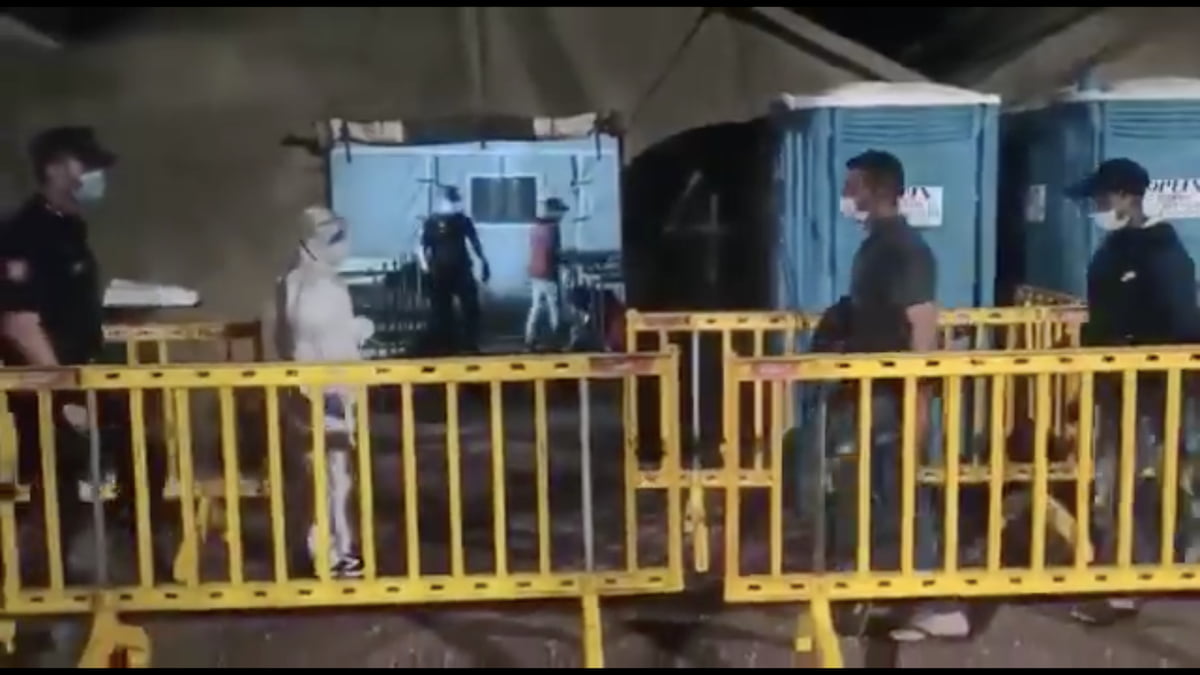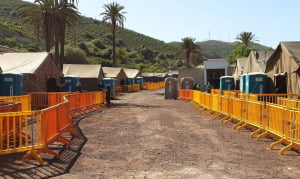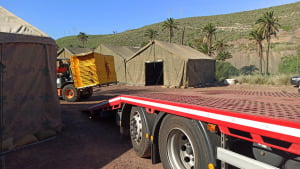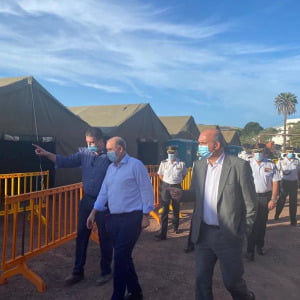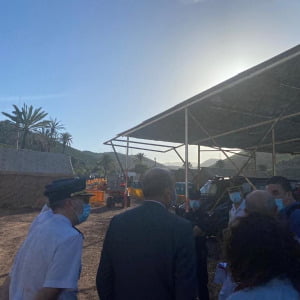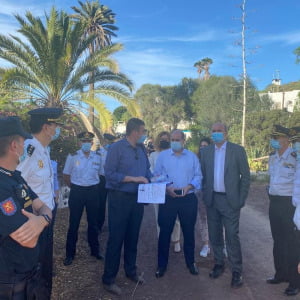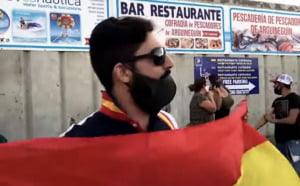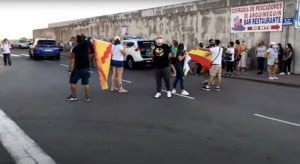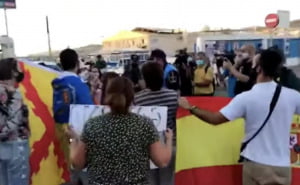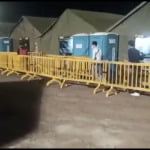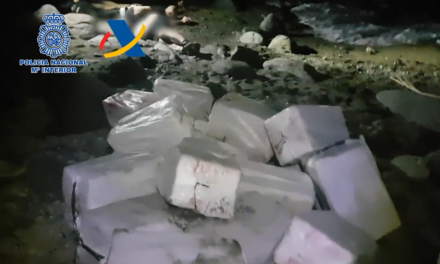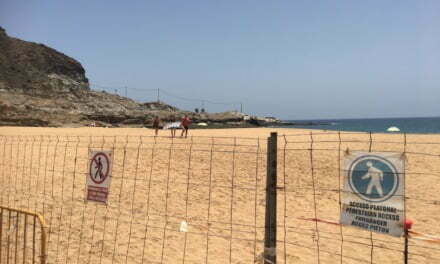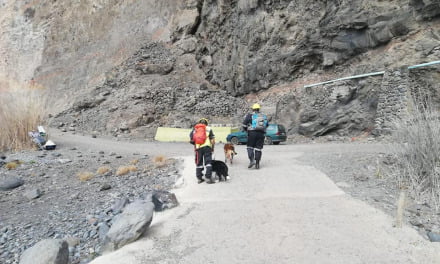 This Wednesday afternoon the first transfer of migrants from the Port of Arguineguín camp, by bus bound for the military tents of the newly set up Temporary Attention Centre for Foreigners (CATE) in Barranco Seco, Las Palmas, left just after 6pm, to the sound of jeering from a small group demonstrators at the port, waving Spanish flags and other symbols. The group of about 50 migrants was the first of 200 scheduled to be transferred this Wednesday from the port, a number alluded to by Mogán’s mayor yesterday. The newly erected migrant processing facilities, in the capital of Gran Canaria, had been arranged by the Spanish Migration Ministry and the Army last week, with preparations expected to be finalised this week.
This Wednesday afternoon the first transfer of migrants from the Port of Arguineguín camp, by bus bound for the military tents of the newly set up Temporary Attention Centre for Foreigners (CATE) in Barranco Seco, Las Palmas, left just after 6pm, to the sound of jeering from a small group demonstrators at the port, waving Spanish flags and other symbols. The group of about 50 migrants was the first of 200 scheduled to be transferred this Wednesday from the port, a number alluded to by Mogán’s mayor yesterday. The newly erected migrant processing facilities, in the capital of Gran Canaria, had been arranged by the Spanish Migration Ministry and the Army last week, with preparations expected to be finalised this week.
Transfer of migrants was already planned
 The fact that the plans were already in place to start the transfer of migrants on Wednesday raises several important questions regarding the sudden, and erroneous, eviction of more than 200 of them from the port on Tuesday, sparking national headlines and ubiquitous outrage and an ongoing investigation into how and why they were simply left to fend for themselves, first in Arguineguín and then transported to the capital to be left right outside Spain’s Government Delegation buildings.
The fact that the plans were already in place to start the transfer of migrants on Wednesday raises several important questions regarding the sudden, and erroneous, eviction of more than 200 of them from the port on Tuesday, sparking national headlines and ubiquitous outrage and an ongoing investigation into how and why they were simply left to fend for themselves, first in Arguineguín and then transported to the capital to be left right outside Spain’s Government Delegation buildings.
 Meanwhile, this afternoon in Las Palmas, Spain’s Government Delegate in the Canary Islands, Anselmo Pestana, made clear to journalists that neither he nor his team gave the order for the departure of migrants from the Arguineguín camp, on Tuesday, particularly without accommodation planned, which caused a situation he said “will not be repeated”.
Meanwhile, this afternoon in Las Palmas, Spain’s Government Delegate in the Canary Islands, Anselmo Pestana, made clear to journalists that neither he nor his team gave the order for the departure of migrants from the Arguineguín camp, on Tuesday, particularly without accommodation planned, which caused a situation he said “will not be repeated”.
Pestana did not wish to go into more detail, at this stage, about where, or from whom, the instruction came to march 227 Moroccan migrants from the Red Cross camp, but confirmed that they had all been at the port for more than the 72 hours legally allowed, and expressed his disapproval of it having happened at all without facilities prepared for them to move to. The Ministry of the Interior has opened an urgent investigation to find out why the situation occurred at all.
“It is evident that there has been a coordination error that we have to solve. The magnitude of the migratory problem facing the Canary Islands is paramount. We are talking about increases of more than 1,100%, with arrivals already having exceeded 18,000 people” he remarked.
Fernando Grande-Marlaska, Spain’s Interior Minister declared, this morning, at the Congress of Deputies in Madrid, that he has ordered a start to the transfer of migrants from the Port of Arguineguín to the Barranco Seco military camp. The number of people on the dockside stood at 2,301 this Tuesday, about the same number of people who live in the town, while the capacity of new camp stands at just 800.
 Today Pestana met with Sophie Muller, the head of the UNHRC refugee council operations in Spain, and this afternoon he met with the general director of the Policia Nacional, Francisco Pardo, the operational deputy director of the Policia Nacional, José Ángel Gonzalez, the Canary Islands Police superior chief, Rafael Martínez, and the sub-delegate in Las Palmas, Teresa Mayans, to visit the new CATE facility in Barranco Seco.
Today Pestana met with Sophie Muller, the head of the UNHRC refugee council operations in Spain, and this afternoon he met with the general director of the Policia Nacional, Francisco Pardo, the operational deputy director of the Policia Nacional, José Ángel Gonzalez, the Canary Islands Police superior chief, Rafael Martínez, and the sub-delegate in Las Palmas, Teresa Mayans, to visit the new CATE facility in Barranco Seco.
Anti-Immigration Protesters
Meanwhile, this Wednesday afternoon, outside the Arguineguín port, a ramshackle group of protesters demonstrated against the very presence of migrants at the Arguineguín dock. The group, carrying Spanish flags, and other nationalist symbology, caused heightened tension as protesters, many not wearing masks properly or observing social distance rules, harried journalists, and belligerently sought to hamper police efforts to ensure a smooth departure, following yesterday’s embarrassing scenes, that were broadcast on news channels throughout the country.
 Slogans shouted included “Illegals Out!”, “Criminal government!”, “Government resign”, and the old chestnut “We are not fascists, we are realists!” all of which were seen and heard during the two recent Saturday demonstrations through the town, following a banner demanding “Stop Illegal Immigration”, and which appeared to be led by local mayoress, Onalia Bueno, and known far-right activists.
Slogans shouted included “Illegals Out!”, “Criminal government!”, “Government resign”, and the old chestnut “We are not fascists, we are realists!” all of which were seen and heard during the two recent Saturday demonstrations through the town, following a banner demanding “Stop Illegal Immigration”, and which appeared to be led by local mayoress, Onalia Bueno, and known far-right activists.
 This Wednesday afternoon, even as the removal of the migrants began, their sparse protest held banners demanding “Stop the invasion plan” and “They do not respect our rights or our culture.” Cries accusing migrants of being “xenophobic to Canarian people” were also heard. Bueno was nowhere to be seen, having spent much of the day making statements to the press.
This Wednesday afternoon, even as the removal of the migrants began, their sparse protest held banners demanding “Stop the invasion plan” and “They do not respect our rights or our culture.” Cries accusing migrants of being “xenophobic to Canarian people” were also heard. Bueno was nowhere to be seen, having spent much of the day making statements to the press.
 Guardia Civil troops photographed protesters IDs and visibly applied controls to the situation to prevent missteps in, what everyone agrees, is an already very difficult situation. The small, but loud, rabble did what they could to grab the attention of the press.
Guardia Civil troops photographed protesters IDs and visibly applied controls to the situation to prevent missteps in, what everyone agrees, is an already very difficult situation. The small, but loud, rabble did what they could to grab the attention of the press.

